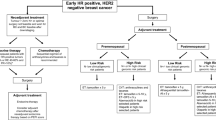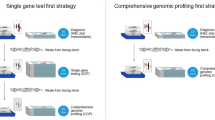Abstract
In May 2013, Angelina Jolie revealed to the media that she had undergone preventive double mastectomy after testing positive for a BRCA1 gene mutation. Media coverage has been extensive, but it is not clear how such a personal story affected the public and cancer genetics clinics. We conducted a retrospective review using data from the clinical database of the Familial Cancer Program at our centre. The impact of Ms. Jolie’s story on genetic counseling referrals and the appropriateness of such referrals were assessed and reported. The number of women referred for genetic counseling increased by 90 % after 6 months and remained high one year after AJ’s story with an increase of 88 % from baseline. The number of women who qualified for genetic testing increased by 105 % after 6 months; this increase persisted but was somewhat lower after one year with an increase of 68 % from baseline. Furthermore the number of BRCA1/2 carriers identified increased by 110 % after 6 months and by 42 % after one year.
The effect of Mrs. Jolie’s story persisted one year after its release; however in the latter half of the year, the hereditary cancer risk of referred women was significantly lower than initially observed. The next challenge for our health care system will not only be to meet the increased demand for cancer genetic services in our region, but also to ensure that referrals and hence use of genetic counseling resources are appropriate.


Similar content being viewed by others
References
Adair, A., Hyde-Lay, R., Einsiedel, E., & Caulfield, T. (2009). Technology assessment and resource allocation for predictive genetic testing: a study of the perspectives of Canadian genetic health care providers. BMC Medical Ethics, 10, 6.
American College of Surgeons Cancer Program Standards: Ensuring Patient-Centered Care. (2016) Edition. Accessed at https://www.facs.org/~/media/files/quality%20programs/cancer/coc/2016%20coc%20standards%20manual_interactive%20pdf.ashx
Antoniou, A., Pharoah, P. D., Narod, S., Risch, H. A., Eyfjord, J. E., Hopper, J. L., et al. (2003). Average risks of breast and ovarian cancer associated with BRCA1 or BRCA2 mutations detected in case series unselected for family history: a combined analysis of 22 studies. American Journal of Human Genetics, 72(5), 1117–1130.
Borzekowski, D. L., Guan, Y., Smith, K. C., Erby, L. H., & Roter, D. L. (2013). The Angelina effect: immediate reach, grasp and impact of going public. Genetics in Medicine, 16, 516–521.
Brown, M. L., & Potosky, A. L. (1990). The presidential effect: the public health response to media coverage about Ronald Reagan’s colon cancer episode. Public Opinion Quarterly, 54, 317–329.
Chapman, S., McLeod, K., Wakefield, M., & Holding, S. (2005). Impact of news of celebrity illness on breast cancer screening: Kylie Minogue’s breast cancer diagnosis. The Medical Journal of Australia, 183, 247–250.
Chen, S., & Parmigiani, G. (2007). Meta-analysis of BRCA1 and BRCA2 penetrance. Journal of Clinical Oncology, 25(11), 1329–1333.
Cram, P., Fendrick, A. M., Inadomi, J., Cowen, M. E., Carpenter, D., & Vijan, S. (2003). The impact of a celebrity promotional campaign on the use of colon cancer screening: the Katie Couric effect. Archives of Internal Medicine, 163, 1601–1605.
Dentzer, S. (2009). Communicating medical news – pitfalls of health care journalism. NEJM, 360, 1–3.
Doheny K. Most women don’t understand their breast cancer risk: survey. http://healthyliving.msn.com/diseases/breast-cancer/most-women-dont-understand-their-breast-cancer-risk-survey. Accessed 4 September 2013.
Evans, D. G., Lalloo, F., Hopwood, P., Maurice, A., Baildam, A., Brain, A., et al. (2005). Surgical decisions made by 158 women with hereditary breast cancer aged <50 years. European Journal of Surgical Oncology, 31, 1112–1118.
Evans, G., Barwell, J., Eccles, D., Collins, A., Izatt, L., Jacobs, C., et al. (2014). The Angelina Jolie effect: how high celebrity profile can have a major impact on provision of cancer related services. Breast Cancer Research, 16, 442.
Finch, A. P., Lubinski, J., Moller, P., et al. (2014). Impact of oophorectomy on cancer incidence and mortality in women with a BRCA1 or BRCA2 mutation. Journal of Clinical Oncology, 32, 1547–1553.
Finch, A., Wang, M., Fine, A., et al. (2015). Genetic testing for BRCA1 and BRCA2 in the province of Ontario. Clinical Genetics. doi:10.1111/cge.12647.
Gabai-Kapara, E., Lahad, A., Kaufman, B., et al. (2014). Population-based screening for breast and ovarian cancer risk due to BRCA1 and BRCA2. Proceedings of the National Academy of Sciences of the United States of America, 111, 14205–14210.
Jolie A. (2013). My medical choice. New York Times; 14 May. http://www.nytimes.com/2013/05/14/opinion/my-medical-choice.html
King, M. C., Levy-Lahad, E., & Lahad, A. (2014). Population-based screening for BRCA1 and BRCA2: 2014 Lasker award. Journal of the American Medical Association, 312(11), 1091–1092.
Kreps, G. J. (2003). The impact of communication on cancer risk, incidence, morbidity, mortality, and quality of life. Health Communication, 15, 161–169.
Manchanda, R., Legood, R., Burnell, M., et al. (2014). Cost-effectiveness of population screening for BRCA mutations in Ashkenazi Jewish women compared with family history-based testing. Journal of the National Cancer Institute, 107, 380.
Metcalfe, K. A., et al. (2008). International variation in rates of uptake of preventive options in BRCA1 and BRCA2 mutation carriers. International Journal of Cancer, 122(9), 2017–2022.
Metcalfe, K. A., Poll, A., Royer, R., et al. (2010). Screening for founder mutations in BRCA1 and BRCA2 in unselected Jewish women. Journal of Clinical Oncology, 28(3), 387–391.
Moyer, V. A. (2014). Risk assessment, genetic counseling, and genetic testing for BRCA-related cancer in women: US preventive services task force recommendation statement. Annals of internal medicine., 160(4), 271–281.
Nattinger, A. B., Hoffmann, R. G., Howell-Pelz, A., & Goodwin, J. S. (1998). Effect of Nancy Reagan’s mastectomy on choice of surgery for breast cancer by US women. JAMA, 279, 762–766.
Niederdeppe, J. (2008). Beyond knowledge gaps: examining sociodemographic differences in response to cancer news. Human Communication Research., 34, 423–447.
Ogata Jones, K., Denham, B. E., & Springston, J. K. (2006). Effects of mass and interpersonal communication on breast cancer screening: advancing agenda-setting theory in health contexts. Journal of Applied Communication Research, 34, 94–113.
Parthasarathy, S. (2007). Building genetic medicine. Breast cancer, technology, and the comparative politics of health care. Cambridge, MA: MIT press.
Platt, J., Zhong, T., Moineddin, R., Booth, G. L., Easson, A. M., Fernandes, K., et al. (2015). Geographic variation immediate and delayed breast reconstruction utilization in Ontario, Canada and plastic surgeon availability: a population-based observational study. World journal of surgery., 21, 1–3.
Raphael J, Hewitt P, Graham T, Ott K, Mancuso T, Lorentz J, Emmerson M, Eisen A. (2015). Rates of prophylactic surgeries among BRCA 1 or 2 mutation carriers: A single institution experience. Abstract [P6-10-17], San Antonio Breast Cancer Symposium.
Risch, H. A., McLaughlin, J. R., Cole, D. E., Rosen, B., Bradley, L., Fan, I., et al. (2006). Population BRCA1 and BRCA2 mutation frequencies and cancer penetrances: a KIN-cohort study in Ontario, Canada. Journal of the National Cancer Institute, 98(23), 1694–1706.
Swami, V., Taylor, R., & Carvalho, C. (2009). Acceptance of cosmetic surgery and celebrity worship: evidence of associations among female undergraduates. Pers Individ Dif, 47, 869–872.
Vasen, H. F., Tesfay, E., Boonstra, H., Mourits, M. J., Rutgers, E., Verheyen, R., et al. (2005). Early detection of breast and ovarian cancer in families with BRCA mutations. European Journal of Cancer, 41, 549–554.
Author information
Authors and Affiliations
Corresponding author
Ethics declarations
Conflict of Interest
S. Verma: Advisory Board – Roche, EISAI, Amgen, Novartis, Astra Zeneca. All remaining authors have declared no conflicts of interest.
Human Studies and Informed Consent
For this type of study (retrospective) formal consent is not required. Informed consent was originally obtained from all individual participants included in the study.
Animal studies
This article does not contain any studies with animals performed by any of the authors.
Rights and permissions
About this article
Cite this article
Raphael, J., Verma, S., Hewitt, P. et al. The Impact of Angelina Jolie (AJ)’s Story on Genetic Referral and Testing at an Academic Cancer Centre in Canada. J Genet Counsel 25, 1309–1316 (2016). https://doi.org/10.1007/s10897-016-9973-6
Received:
Accepted:
Published:
Issue Date:
DOI: https://doi.org/10.1007/s10897-016-9973-6




